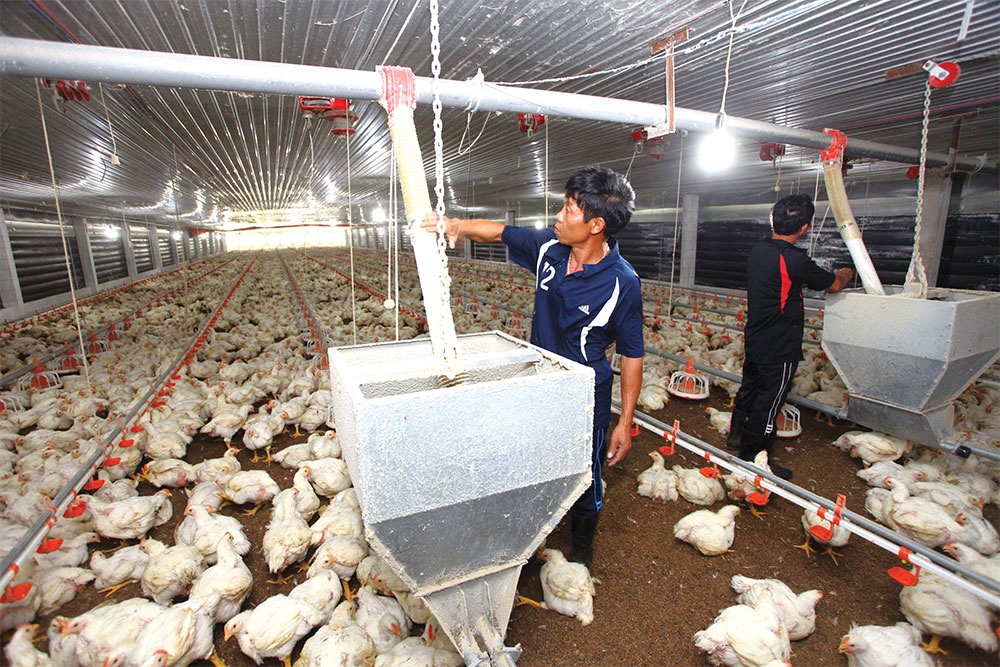
Livestock companies have meeting with MARD, Dong Nai province for finding solution
Latest
 |
| Breeding farms could lose out massively if relocation strategies are not efficient (Photo: Le Toan) |
In March, the Dong Nai Breeding Association, which represents over 6,000 breeding households and livestock companies operating in the province, met with the Ministry of Agriculture and Rural Development and Dong Nai People’s Committee to discuss solutions to minimise damage for breeding farms that have been placed on a list for relocation or termination.
In late February, Dong Nai People’s Committee revealed that it required relocation of 2,100 breeding farms and to shut down approximately 900 breeding facilities before January 2025. The reason for the drastic move is to remove livestock facilities from residential areas, which are causing untold amounts of environmental pollution.
The province’s decision immediately worried breeding households and livestock companies, with representatives stating that the roadmap is too short, financial information or assistance is scarce, and there is zero information on where to locate to.
Dong Nai is a hub for some of the largest livestock companies in the country, such as C.P. Vietnam, Cargill, CJ, Masan, and Hoa Phat. These Groups manage farms under outsourcing and rental facilities.
Nguyen Tri Cong, Chairman of the Dong Nai Livestock Association, said“The affected facilities make up half of the total breeding facilities in the province. Many of these are large-scale outsourcing farms of foreign-invested enterprises and their farms.”
Cong acknowledged that relocating and shutting down livestock farms that cause environmental pollution is reasonable, but there is more to consider. “Many facilities have been built methodically and were taken into operation only a short time ago with massive amounts of total investment. Many licences of such facilities are nowhere near expiring. If they are forced to relocate, they will suffer large damage financially,” Cong said.
“The province has announced this deadline for relocation and shutdown without attaching any specific guidance or compensation information. This is why both households and firms are confused about the potential expenditure to implement this task,” he added.
In front of the concerns, the Association has been working with the authorities to look at building a compensation price framework and simultaneously propose extension of the deadline to relocate new farms and valid large-scale farms.
The Association also raised the concern that the facilities set to be relocated account for 60 per cent of livestock product sources of the province. Thus, the huge undertaking over a short period of time may cause supply chain disruption of livestock products not only in Dong Nai but also in Ho Chi Minh City.
Many outsourcing farms and breeding facilities of both domestic and foreign-invested firms have been operating for nearly 20 years and cause water and air pollution. It is a nationwide problem, in which many facilities have caused violations and been handed fines worth thousands of dollars.
Several farms under Dabaco Group management in Tuyen Quang, Bac Ninh, Haiphong, Phu Tho, Ha Nam, and Ha Tinh provinces were fined in recent times for violations relating to the discharge of waste into the environment.
Tracking down locations for farms is also a major concern. A representative of one foreign-invested livestock company told VIR that the company wants to expand its farm network, but it is struggling to find a suitable location.
“The location must be far away from residential areas, but on top of that, many localities do not encourage livestock ventures. And if they do, they tend not to allocate much land in their planning,” he said.
In Dong Nai, many districts such as Thong Nhat, Cam My, and Trang Bom, are refusing new livestock projects due to concerns about environmental pollution. Land for the sector is further narrowed because the province wants to extend planning for industrial parks in order to attract high-quality ventures.
The procedures for getting licences are also complicated and require approvals from many departments. “In some cases, we have available capital to implement projects but fail due to the barrier of procedures,” the representative added.





















